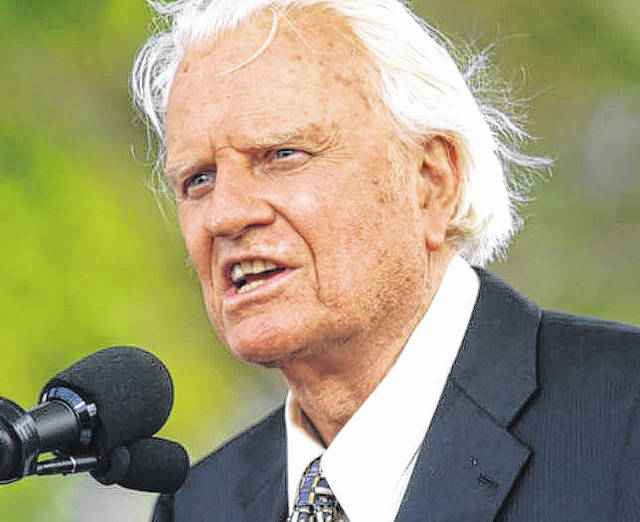LAURINBURG – Billy Graham, the man who preached to millions and was known as “pastor to presidents” is being remembering for being both down-to-earth and unassuming.
Graham passed away Wednesday at his home in Montreat. He was 99
Rev. Garland Pierce, pastor of Bright Hopewell Baptist Church in Laurinburg, grew up watching Graham’s televised sermons and was touched by his passion and faith.
Graham spent 66 years as an evangelist spreading the gospel across the world. He delivered his interpretation of salvation to people from the average citizen to presidents and heads of state.
“I remember as a young man with a black and white TV watching him preach in stadiums with my grandparents,” said Pierce. “Rev. Graham was always an inspiration and had an evangelistic zeal to bring the message of Christ to so many.”
Pierce called Graham’s preaching style personable.
“It was plain and simple; anyone could understand it. It seemed like he was talking to you and he really had a concern for your soul. He appealed directly to you as an individual although he was talking to millions,” Pierce said.
Pierce believes the good work that Graham did will continue to live on through Graham’s son, Franklin, who is his father’s successor as leader of the Billy Graham Evangelistic Association.
North Carolina Sen. Richard Burr expressed sadness and respect for Graham and his work.
“America’s pastor was an inspiration to millions of Christians in our country and across the world. While his humility, faith, and booming voice will be sorely missed, today, he is at peace with God,” Burr said.
Although Rev. Dewayne Hicks, pastor of Laurinburg Presbyterian Church, did not always see eye-to-eye with Graham’s interpretation of salvation, he admired and respected Graham’s impact.
“He was able to inspire the Christian church in America after the Second World War when people were looking for signs of hope and faith. He was able, through his very persuasive preaching, to convince people of their need for a personal relationship with Jesus Christ and that mere church attendance or the occasional prayer at the table was not enough,” Hicks said.
Hick’s calls Graham’s impact on faith a positive one but believes that there are many approaches to Christianity. Hicks differs with Graham in his belief that a relationship with Christ need not always be an immediate and emotional decision but can be attained gradually through “living out the Christian faith.”
Although Graham used media like television, books and radio to deliver his message, Hicks said Graham is not a typical televangelist.
“He was also someone who doesn’t entirely fit into the category of the current evangelists of a Jerry Falwell type or those who have entirely embraced a conservative political ideology,” Hicks said of Graham’s behavior. “He chose to be very careful about the line between a religious issue and a political issue, and that allowed him to not get embroiled in some of the controversial issued that had divided the country.”
Graham was born William Franklin “Billy” Graham Jr. on Nov. 7, 1918 and grew up on a dairy farm near Charlotte. He became a Christian 1934 after hearing a service preached by traveling evangelist, Mordecai Ham.
He earned a Bachelor of theology from the Florida Bible Institute in 1940 and a bachelor of arts in anthropology from Wheaton College, in Illinois in 1943.
He married Ruth McCue Bell in 1943 and was preceded by her in death in in 2007. The couple had five children: Virginia, Anne, Ruth, Nelson and William Franklin Graham III.
Graham was often quoted as saying, “My one purpose in life is to help people find a personal relationship with God, which, I believe, comes through knowing Christ.”
He began his career as a Baptist pastor in Western Springs, Ill in 1943.
He became a field representative with Youth for Christ in 1945 and served there until 1949. He traveled across the US leading revivals that would set the stage and create a road map for his future ministry. Beginning in 1947 he began to run his own religious campaigns.
In 1949 Graham received national notoriety when William Randolph Hearst and others publicized his Los Angeles crusade.
By 1950 he had formed the Billy Graham Evangelistic Association and had begun to run revivals and crusades on a larger scale. He also started a national radio program, “Hour of Decision” which aired on the ABC network. The program was eventually syndicated worldwide.
In 1954 he led a 12-week London campaign which reached more than 2 million people and catapulted him to international celebrity status.
In 1970 he led a crusade in New York and preached to a packed Shea Stadium.
He would become history’s most-traveled Christian evangelist speaking in person to more than 210 million people in 185 countries and territories including Hungary, Moscow and South Korea.
The minister wrote daily newspaper columns and authored 32 books including his best-selling autobiography “Just as I Am” in 1997.
Graham has been awarded numerous accolades including the $1 million Templeton Prize for Progress in Religion in 1982, Presidential Medal of Freedom in 1983, a Congressional Gold Medal in 1996, and had an honorary British knighthood conferred upon him in 2001.
The Billy Graham Library was dedicated in Charlotte in May 2007 and attended by three former U.S. presidents: Jimmy Carter, George H.W. Bush and Bill Clinton.
In recent years Graham has suffered with a number of health issues including prostate cancer, hydrocephalus − fluid in the brain and Parkinson’s disease.

